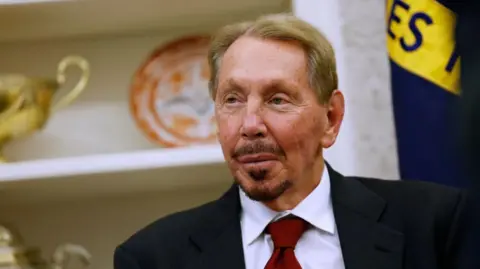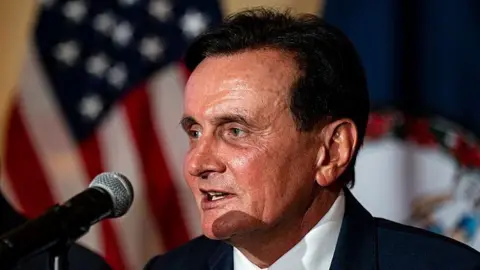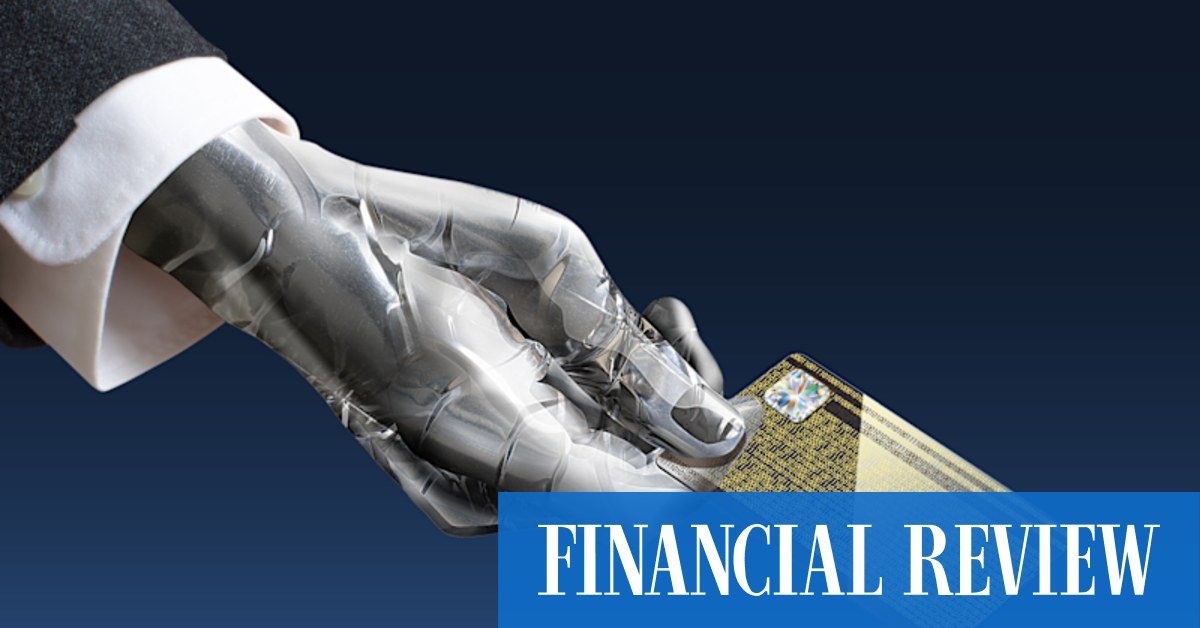Business
Oracle’s Larry Ellison briefly surpasses Elon Musk as world’s richest man

Danielle KayeBusiness reporter
 Getty Images
Getty ImagesElon Musk briefly lost his title as the world’s richest person to Larry Ellison, the co-founder of Oracle and an ally of US President Donald Trump.
Ellison’s wealth surged to $393bn (£290bn) on Wednesday morning, surpassing Musk’s $385bn (£284bn), according to the Bloomberg Billionaires Index.
The jump came after shares in Oracle, which make up a significant part of Ellison’s fortune, soared more than 40%, boosted by the database software company’s surprisingly rosy outlook for its cloud infrastructure business and artificial intelligence (AI) deals.
But the firm’s share price had shed some of those gains by the end of the day, putting Musk back on top.
Before briefly losing it to Ellison, Musk had held the title of world’s richest person for nearly one year.
He could receive a pay package worth over $1tn (£740bn) if he hits a list of ambitious targets over the next decade, the board of the electric car firm has proposed.
But shares in Musk’s most valuable business, Tesla, have fallen this year.
The electric vehicle maker has grappled with investor jitters over the Trump administration’s rollback of electric vehicle initiatives, on top of consumer backlash to Musk’s political involvement.
Oracle has recently been propelled by growing demand for data centre infrastructure.
The company projected as part of its quarterly earnings report on Tuesday that revenue from its cloud business will jump 77% this year, to $18bn, with further growth expected in the coming years.
Oracle has reported a surge in demand among AI companies for its data centres, which helped push its stock dramatically higher.
It signed four multibillion-dollar contracts with customers in the last quarter and anticipates several more deals in the months ahead, chief executive Safra Catz said on Tuesday.
Trump ties and media ambitions
Ellison, 81, helped start Oracle in 1977 and rose to prominence in the 1990s, when he became a public figure known as much for his lavish lifestyle as for the database company behind his fortune.
He was Oracle’s chief executive until 2014 and is now the company’s chairman and chief technology officer.
And he has positioned himself as an ally to President Trump.
When Trump returned to the White House in January, Ellison appeared alongside OpenAI’s Sam Altman and SoftBank’s Masayoshi Son to announce a project called Stargate, to build out AI infrastructure in the US.
Oracle has also emerged as a possible buyer of TikTok, the app owned by the Chinese internet company ByteDance. TikTok is facing a ban in the US unless it divests itself of its ByteDance ownership.
In January, when asked whether he was open to Musk buying TikTok, Trump responded: “I’d like Larry to buy it, too.”
Ellison’s media ambitions extend beyond TikTok.
He funded the bulk of a $8bn bid by his son to acquire Paramount, which owns CBS and MTV.
That deal between Paramount and the media company Skydance, which is controlled by his son David, closed last month.
Business
Jaguar Land Rover suppliers ‘face bankruptcy’ due to hack crisis

The past two weeks have been dreadful for Jaguar Land Rover (JLR), and the crisis at the car maker shows no sign of coming to an end.
A cyber attack, which first came to light on 1 September, forced the manufacturer to shut down its computer systems and close production lines worldwide.
Its factories in Solihull, Halewood, and Wolverhampton are expected to remain idle until at least Wednesday, as the company continues to assess the damage.
JLR is thought to have lost at least £50m so far as a result of the stoppage. But experts say the most serious damage is being done to its network of suppliers, many of whom are small and medium sized businesses.
The government is now facing calls for a furlough scheme to be set up, to prevent widespread job losses.
David Bailey, professor of business economics at Aston University, told the BBC: “There’s anywhere up to a quarter of a million people in the supply chain for Jaguar Land Rover.
“So if there’s a knock-on effect from this closure, we could see companies going under and jobs being lost”.
Under normal circumstances, JLR would expect to build more than 1,000 vehicles a day, many of them at its UK plants in Solihull and Halewood. Engines are assembled at its Wolverhampton site. The company also has large car factories in China and Slovakia, as well as a smaller facility in India.
JLR said it closed down its IT networks deliberately in order to protect them from damage. However, because its production and parts supply systems are heavily automated, this meant cars simply could not be built.
Sales were also heavily disrupted, though workarounds have since been put in place to allow dealerships to operate.
Initially, the carmaker seemed relatively confident the issue could be resolved quickly.
Nearly two weeks on, it has become abundantly clear that restarting its computer systems has been a far from simple process. It has already admitted that some data may have been seen or stolen, and it has been working with the National Cyber Security Centre to investigate the incident.
Experts say the cost to JLR itself is likely to be between £5m and £10m per day, meaning it has already lost between £50m and £100m. However, the company made a pre-tax profit of £2.5bn in the year to the end of March, which implies it has the financial muscle to weather a crisis that lasts weeks rather than months.
JLR sits at the top of a pyramid of suppliers, many of whom are highly dependent on the carmaker because it is their main customer.
They include a large number of small and medium-sized firms, which do not have the resources to cope with an extended interruption to their business.
“Some of them will go bust. I would not be at all surprised to see bankruptcies,” says Andy Palmer, a one-time senior executive at Nissan and former boss of Aston Martin.
He believes suppliers will have begun cutting their headcount dramatically in order to keep costs down.
Mr Palmer says: “You hold back in the first week or so of a shutdown. You bear those losses.
“But then, you go into the second week, more information becomes available – then you cut hard. So layoffs are either already happening, or are being planned.”
A boss at one smaller JLR supplier, who preferred not to be named, confirmed his firm had already laid off 40 people, nearly half of its workforce.
Meanwhile, other companies are continuing to tell their employees to remain at home with the hours they are not working to be “banked”, to be offset against holidays or overtime at a later date.
There seems little expectation of a swift return to work.
One employee at a major supplier based in the West Midlands told the BBC they were not expecting to be back on the shop floor until 29 September. Hundreds of staff, they say, had been told to remain at home.
When automotive firms cut back, temporary workers brought in to cover busy periods are usually the first to go.
There is generally a reluctance to get rid of permanent staff, as they often have skills that are difficult to replace. But if cashflow dries up, they may have little choice.
Labour MP Liam Byrne, who chairs the Commons Business and Trade Committee, says this means government help is needed.
“What began in some online systems is now rippling through the supply chain, threatening a cashflow crunch that could turn a short-term shock into long-term harm”, he says.
“We cannot afford to see a cornerstone of our advanced manufacturing base weakened by events beyond its control”.
The trade union Unite has called for a furlough system to be set up to help automotive suppliers. This would involve the government subsidising workers’ pay packets while they are unable to do their jobs, taking the burden off their employers.
“Thousands of these workers in JLR’s supply chain now find their jobs are under an immediate threat because of the cyber attack,” says Unite general secretary, Sharon Graham.
“Ministers need to act fast and introduce a furlough scheme to ensure that vital jobs and skills are not lost while JLR and its supply chain get back on track.”
Business and Trade Minister Chris Bryant said: “We recognise the significant impact this incident has had on JLR and their suppliers, and I know this is a worrying time for those affected.
“I met with the chief executive of JLR yesterday to discuss the impact of the incident. We are also in daily contact with the company and our cyber experts about resolving this issue.”
Business
AstraZeneca pauses £200m Cambridge investment

Mitchell LabiakBusiness reporter and
Simon JackBusiness editor
 Getty Images
Getty ImagesAstraZeneca has paused plans to invest £200m at a Cambridge research site in a fresh blow to the UK pharmaceutical industry.
The project, which was set to create 1,000 jobs, was announced in March 2024 by the previous government alongside another project in Liverpool, which was shelved in January.
Friday’s announcement comes after US pharmaceutical giant Merck scrapped a £1bn UK expansion, blaming a lack of government investment, and as President Donald Trump pressures pharmaceutical firms to invest more in the US.
An AstraZeneca spokesperson said: “We constantly reassess the investment needs of our company and can confirm our expansion in Cambridge is paused.”
Over the last 10 years, UK spending on medicines has fallen from 15% of the NHS budget to 9%, while the rest of the developed world spends between 14% and 20%.
Meanwhile, pharmaceutical companies have been looking to invest in the US following Trump’s threats of sky-high tariffs on drug imports.
In July, AstraZeneca said it would invest $50bn (£36.9bn) in the US on “medicines manufacturing and R&D [research and development]”.
Earlier this week Merck, which had already begun construction on a site in London’s King’s Cross which was due to be completed by 2027, said it no longer planned to occupy it.
The multi-national business, known as MSD in Europe, said it would move its life sciences research to the US and cut UK jobs, blaming successive governments for undervaluing innovative medicines.
 Getty Images
Getty ImagesAstraZeneca’s announcement on Friday means none of the £650m UK investment trumpeted by the last government will currently happen.
The paused Cambridge project would have been an expansion of its existing Discovery Centre, which already hosts 2,300 researchers and scientists.
The stoppage comes after it scrapped plans to invest £450m in expanding a vaccine manufacturing plant in Merseyside in January, blaming a reduction in government support.
It said at the time that after “protracted” talks, a number of factors influenced the move, including “the timing and reduction of the final offer compared to the previous government’s proposal”.
Successive UK governments have pointed to life sciences as one of its most successful industries.
Former chancellor Jeremy sector said the sector was “crucial for the country’s health, wealth and resilience” while Chancellor Rachel Reeves said AstraZeneca was one of the UK’s “great companies” days before it scrapped its Liverpool expansion.
Business
CBA, NAB and other big banks building AI agents as business banking competition heats up

Major lenders are building artificial intelligence-powered “agents” – software that can do the same work as humans – in their business banking divisions, as the battle for AI supremacy in financial services intensifies despite workforce concerns about the risk to jobs.
Commonwealth Bank of Australia is building what it describes as “virtual relationship managers” in its business bank. The customer-facing technology is in a pilot stage as the bank discusses the timing of a market rollout with regulators.
Loading…
-

 Business2 weeks ago
Business2 weeks agoThe Guardian view on Trump and the Fed: independence is no substitute for accountability | Editorial
-
Tools & Platforms1 month ago
Building Trust in Military AI Starts with Opening the Black Box – War on the Rocks
-

 Ethics & Policy2 months ago
Ethics & Policy2 months agoSDAIA Supports Saudi Arabia’s Leadership in Shaping Global AI Ethics, Policy, and Research – وكالة الأنباء السعودية
-

 Events & Conferences4 months ago
Events & Conferences4 months agoJourney to 1000 models: Scaling Instagram’s recommendation system
-

 Jobs & Careers2 months ago
Jobs & Careers2 months agoMumbai-based Perplexity Alternative Has 60k+ Users Without Funding
-

 Podcasts & Talks2 months ago
Podcasts & Talks2 months agoHappy 4th of July! 🎆 Made with Veo 3 in Gemini
-

 Education2 months ago
Education2 months agoMacron says UK and France have duty to tackle illegal migration ‘with humanity, solidarity and firmness’ – UK politics live | Politics
-

 Education2 months ago
Education2 months agoVEX Robotics launches AI-powered classroom robotics system
-

 Funding & Business2 months ago
Funding & Business2 months agoKayak and Expedia race to build AI travel agents that turn social posts into itineraries
-

 Podcasts & Talks2 months ago
Podcasts & Talks2 months agoOpenAI 🤝 @teamganassi


